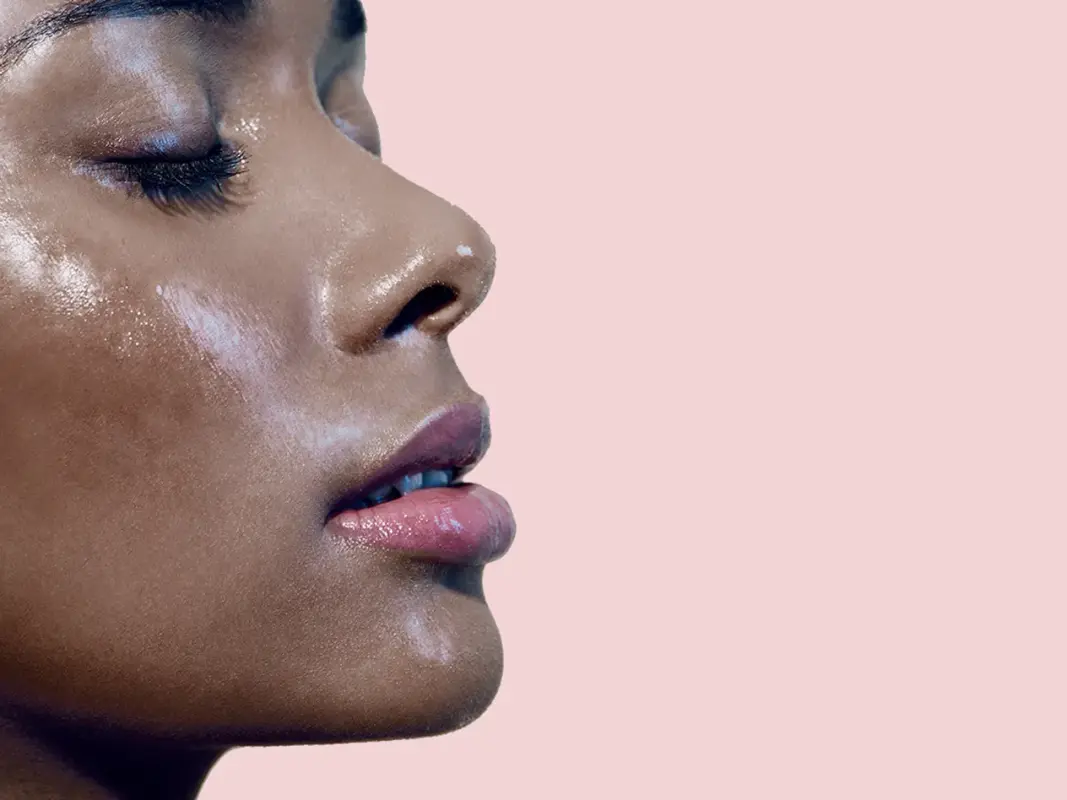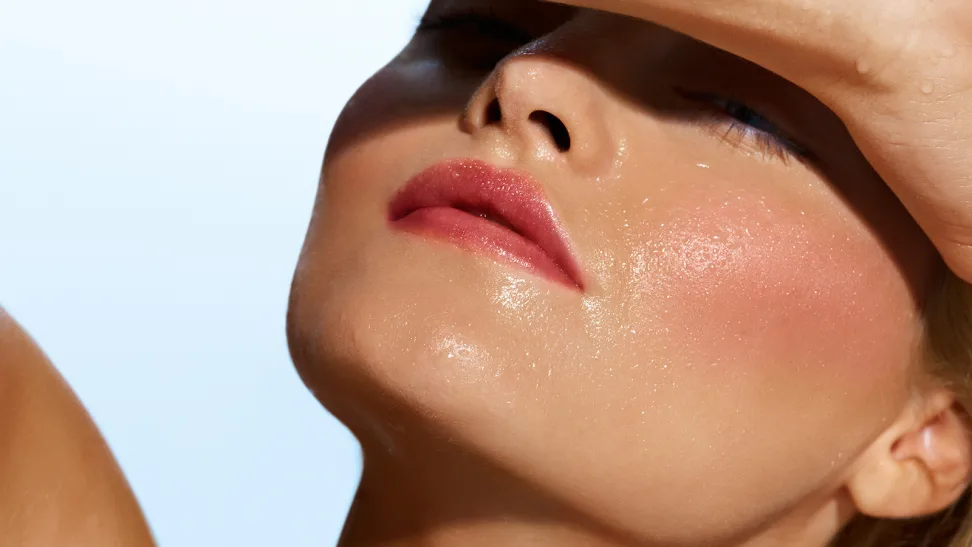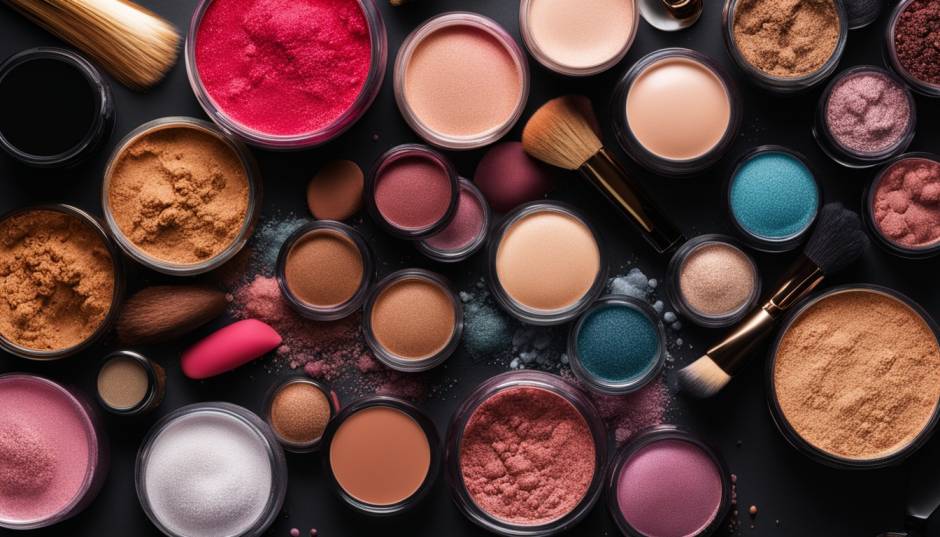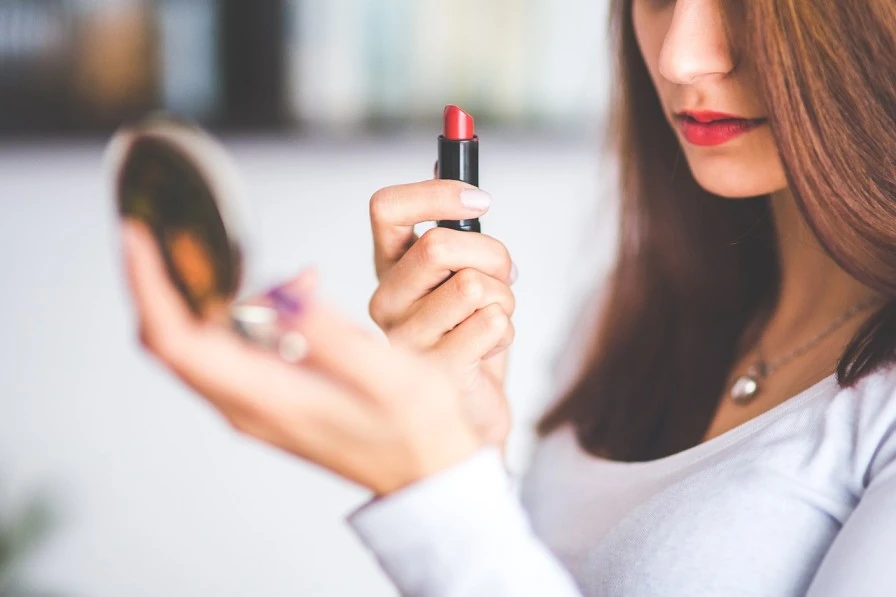Have you ever noticed that a few hours after putting on makeup, it gets oily and shiny? Many individuals suffer from greasy skin and makeup that won't stay put. I enjoy makeup and realize how stressful it can be to have a shiny face all day.
In this article, we will discuss Why Does My Makeup Look Oily After A Few Hours could be greasy and how to keep it looking fresh and matte. We will look into the causes of this issue and weigh possible fixes.
Think of someone whose nose, forehead, and cheeks clearly show dazzling dots. The skin should appear oily and greasy, with an unsightly reflecting gloss. Certain areas may also have enlarged pores or blemishes caused by excessive oil levels. With makeup that does not last long on oily skin, the overall appearance should convey dissatisfaction and rage.
You should understand why your skin becomes oily and how different cosmetics affect you. Learning how to care for your skin and choose the right products will help you maintain flawless makeup all day. This guide is for anyone who has oily skin or notices their face shimmering throughout the day. It will provide you with the tips and ideas you need to combat grease and preserve beautiful makeup.
Read also: Womens Early 2000s Fashion
Understanding Sebum Production

When your skin generates too much sebum, it becomes oily. The oil glands in your skin normally create sebum. Your skin type will affect how much sebum you produce. There are others that naturally produce more oil.
Skin Type and Sebum Overproduction
Active sebaceous glands abound in those with oily skin. They thus produce more sebum. Even without makeup, this may cause your skin to seem glossy and oily. Additionally causing increased sebum are things like stress, hormonal changes, and certain medications.
Environmental Factors Affecting Oil Production
Your skin's production of sebum may change with temperature and humidity. High humidity causes increased activity in your sebaceous glands, resulting in an oily face without makeup. Warm weather might also cause your skin to generate extra oil, which would make your face seem oily.
Identifying Your Skin Type
Getting a long-lasting, non-oily makeup appearance requires knowledge of your skin type. If you regularly feel your face greasy without makeup, you may have oily skin. This kind is well-known for its shine, large pores, and increased break-through risk.
To identify your type, track your skin's behavior throughout the day. Particularly on your forehead, nose, and chin, do you find wonderful shine on your face? Do your pores seem larger than usual? If so, your skin type most likely falls into the oily category. This information enables you to choose the correct cosmetics to maintain a matte and fresh appearance on your face.
Your skin type might be dry, tight, or flaky if it feels that way. Since dry skin absorbs moisture rather than oil, those with dry skin often have no trouble wearing oily makeup. Combining skin types is the condition whereby some people have parts of oily and dry skin. Here the cheeks are dry, but the T-zone—forehead, nose, and chin—may be greasy.
Understanding your skin type helps you pick the finest products and techniques of application. This will help you keep your oily skin free of makeup, appearing fresh and matte all day.
|
Skin Type |
Sebum Production |
Environmental Factors |
|
Oily |
High |
High humidity and warm temperatures |
|
Normal |
Moderate |
Moderate humidity and mild temperatures |
|
Dry |
Low |
Low humidity, cool temperatures |
To solve the problem of glossy cosmetics, you must first understand what drives sebum production and oily skin. Understanding these factors will help you manage your oil production and keep your skin looking fresh and matte all day.
Visualize the small biological process of sebum generation by focusing on the skin's glands and pores. Emphasize its moisturizing and preserving properties, as well as its ability to cause oily deposits and plugged pores when overproduced. Show how sebum moves from the sebaceous glands to the surface. Colder tones should be used to symbolize potential imbalance and excess, while warm tones will help you express the natural warmth and vibrancy of healthy skin. Avoid presenting any specific individual or cosmetic product, allowing the biological process to take center stage.
Read also: Top Women's Hat Trends for 2024
The Role of Makeup Ingredients

Achieving a precise, matte look requires a careful selection of cosmetic components. Products containing oils, silicones, and heavy lotions retain sebum, which aggravates oily skin. Choosing makeup intended for oily skin allows you to get a look that lasts.
If you have oily skin, avoid cosmetics with a high oil content. These will make you look glamorous. Rather, apply mattifying creams to reduce shine and manage oil. When shopping for cosmetics, seek out oil-free, non-comedogenic, or mattifying on the label.
Use silicones carefully in cosmetics. They absorb sebum and make your skin look its best. Choose silicone-free products to increase oil control and makeup wear time. This allows for regular skin breathing.
a close-up view of multiple cosmetic ingredients, each with a unique color and texture. Some elements seem more greasy or oily than others, which helps to explain why makeup might seem greasy after a few hours of usage. To emphasize the many types of materials commonly present in cosmetic goods, including sparkling particles, powders, and liquids.
|
Ingredient |
Effect on Oily Skin |
Recommended Alternatives |
|
Oils |
Can exacerbate the appearance of shine and oil. |
Oil-free, non-comedogenic formulas |
|
Silicones |
Can trap sebum and prevent skin from breathing. |
Silicone-free, breathable formulas |
|
Heavy creams |
Can contribute to a greasy, heavy appearance. |
Mattifying and oil control products |
Preparing Your Skin for Makeup Application
Make sure to prep your skin, especially if it's greasy, before applying makeup. A few straightforward actions will help you obtain a smooth, lasting basis for your primer for oily skin and makeup.Visit our dedicated Beauty hub here.
The Importance of Cleansing and Exfoliating
Cleansing is essential for a flawless makeup look. Use a mild, oil-free cleanser to remove debris and sebum. Then exfoliate once a week to remove dead skin and open pores. This improves the efficacy of primer for oily skin and other products.
Using the Right Primer for Oily Skin
Priming your skin changes the game when it comes to oil management and makeup longevity. Choose a primer for oily skin designed to reduce pores and shine. Silica, among other substances, absorbs excess oil throughout the day. Using a setting spray for oily skin is essential for keeping your makeup fresh and in place.
Choosing the Right Makeup Products

Finding the best makeup for oily skin will make you feel and look amazing all day. The correct primers, foundations, and powders make a lot of difference. They keep your skin free of shine and fresh-looking.
Primers for Oily Skin
Select matte, oil-free primers for oily skin. These primers reduce pore visibility while maintaining shine. They also extend the lifespan of your foundation.
Foundations and powders for oily skin
If you have oily skin, look for foundations that wear longer and are oil-free. The optimal base for oily skin will not feel cakey or heavy. Set your makeup and control shine with a translucent powder.
Selecting proper makeup for oily skin will help you look radiant all day. To choose the best primer for oily skin, foundation for oily skin, and powder for oily skin for your skin type, always do research and assess studies.
Read also: Women's Beauty Tips And Tricks
Why Does My Makeup Look Oily After a Few Hours?
A few hours after you put your makeup on, have you ever noticed it looking shiny and greasy? You are not alone. Many people, regardless of skin type, suffer from this problem. Knowing why might help you find out how to maintain beautiful-looking makeup all day.
Your skin's natural oil production is a major factor in producing oily-looking makeup. Your skin's sebum-produced oil can dissolve your makeup. This gives it a shiny, greasy quality. Because they create more sebum, those with oily or mixed skin often struggle with it.
How long your cosmetic products last depends on what they include. Certain cosmetics, especially those rich in chemicals, can aggravate oily skin and plug pores. Still, makeup meant for oily skin can help control extra oil and maintain your fresh look.
An oily look in makeup can result from humidity, temperature, and pollution, as well as makeup itself. These elements may worsen your skin's oil output, resulting in a glossy, greasy look throughout the day.
Understanding what makes makeup greasy helps you act to solve the problem. All help is in applying oil-controlling products, correctly getting ready for the day, and touching up. With these tips, your makeup will look fantastic all day.
Makeup Setting and Touch-Ups

Maintaining the freshness and oil-free quality of your makeup all day can be challenging. Still, there are some useful instruments and advice available. These can keep the shine away and extend the life of your makeup.
Setting Sprays and Blotting Papers
Getting a great setting spray designed for oily skin may truly make a difference. These sprays control shine and oil, which then protect your makeup. Look for ones containing powder and agents that absorb oil to maintain your makeup longevity.
It is also wise to have blotting paper nearby. These little papers absorb shine without altering your makeup. Combining blotting papers with setting sprays can help you have flawless, long-lasting makeup all day.
Read alos: 10 Beauty Hacks How To Grow Your Nails Overnight With Vaseline
Techniques for Controlling Oil Throughout the Day
Maintaining a fresh, matte appearance all day might prove difficult for people with oily skin. Fortunately, there are techniques to control extra oil and prevent glossiness in your makeup. Carrying blotting sheets is a simple way to absorb any excess oil as it comes out.
Blotting papers and touch-ups
Blotting sheets are used to deal with oiliness quickly and silently. Simply press these sheets onto your skin to soak up excess sebum without ruining your makeup. A matte spray or tiny powder can also help you keep your makeup matte all day and renew it.
Oil-Control Products: Mattifying and Control
Using cosmetics designed to manage oil will definitely make your skin seem matte. Search for primers, foundations, and setting powders resistant to oil that maintain the freshness of makeup. Including them in your regular skincare routine can help your makeup appear less greasy or glossy as the day wears on.
Conclusion
Keeping your makeup looking fresh all day depends on understanding why it gets greasy and finding appropriate remedies. It can be your skin type, your surroundings, or your technique of applying makeup. Still, there are techniques to prevent your makeup from shining after a few hours.
Changing your cosmetics and skincare regimen will enable you to identify the best products for oily skin. The key is to use powders suited for oily skin, foundations, and primers. Furthermore, how matte you seem may be greatly changed by layering and setting your makeup.
Although it takes some experimenting, the ideal cosmetic look is well worth it. Using the correct method, you may determine "why does my makeup look oily after a few hours," "how to prevent an oily face after applying makeup," and identify the "best makeup for oily skin." Continue to experiment, and be sure of your decisions.
Additional Resources
Here are some other ideas if you still battle with greasy makeup. To soak up additional gloss, try applying mattifying powders or oil-blotting sheets. A setting spray can also help keep your makeup in place and stop it from glistening.
Consider overhauling your skincare regimen for a long-term remedy. Including a clarifying cleanser or clay mask helps regulate oil and reduce shine. Keeping your skin matte also depends on avoiding too much sun and drinking enough water.
A perfect, shine-free appearance depends on finding the ideal balance for your skin type. Until you discover what suits you, keep trying several goods and techniques. With hard work and patience, you'll quickly overcome the greasy makeup problem.
FAQ's: Why Does My Makeup Look Oily After A Few Hours
Why does my makeup get oily after a few hours?
Your foundation combines with the material remaining on top of your skin when your moisturizer isn't given time to absorb. This may result in greasy skin after applying makeup, caking, and streaking. The bottom line is to wait to apply foundation until after you've given your moisturizer time to work.
How do you stop your makeup from getting oily?
- Apply a makeup primer. “Primer is your best friend when you're trying to control shine,” says Spickard.
- Don't skip your eyelids.
- Opt for matte finish foundations.
- Apply your foundation in thin layers.
- Layer your powders.
- Avoid luminous, dewy formulas.
Why is my face so oily after 2 hours?
Among the several elements that might lead to oily skin include hormones, weather, stress, and heredity. The American Academy of Dermatology also notes that washing with a too strong cleanser may aggravate your skin and perhaps cause more oil production.








